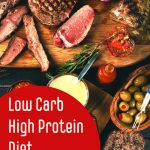Low Carb High Protein Diet
Low carb high protein diets have been in favor again for a while now, and with good reason. There are a lot of benefits to restricting carbohydrates and getting an optimal amount of protein. I've been living the low carb/keto life since 2016 and have never felt better. For the last couple of years, I've been focused on consuming higher protein. Many thought leaders in the low carb and keto space have been revising their views on protein. Even more research is emerging about the importance of optimal protein, especially as we age.
To understand why a low carb high protein diet is valuable, it's important to note that the recommended daily allowances for protein are just the bare minimum to prevent deficiencies. If you're going for optimal body composition and health, the amount of protein needed on a daily basis is much higher. I recently had my free keto macro calculator updated to reflect these new protein recommendations. Use the keto calculator to enter a custom amount of carbs for keto (under 30 recommended) 0r low carb macros (defined in the literature as under 130g per day). The results give personalized calculations for weight loss, weight maintenance or weight gain with outputs for standard keto as well as higher protein.
Low Carb High Protein Diet
Personally I don't even like to say high protein diet, because that still has some negative connotations. I prefer to use the term optimal protein diet, since that better describes what you're trying to achieve. For most people, getting somewhere close too one gram of protein per pound of lean body mass is optimal. If you're unsure about your lean body mass number, it's perfectly acceptable to do one gram of protein per pound of optimal body weight. Everyone has a slightly different definition of what optimal body weight is, but you can get a good idea by using a height/weight chart. There is a useful weight and height calculator for this at CDC.gov.
High Protein Diet L0w Carb, How Low and How High Should You Go?
Now that you have a better idea of how much protein you should eat on a low carb high protein diet, you can start to figure out how you want to approach carbs. While there are certainly additional health benefits to being in ketosis, most people would benefit greatly from just practicing a lower carb, whole foods based diet. If you want to lower your carb intake, you'll go a long way by just eliminating sugary drinks. These are a big source of carbs for a lot of people.
Disclaimer: Links may contain affiliate links, which means we may get paid a commission at no additional cost to you if you purchase through this page. Read our full disclosure here.
After that, start eliminating carbs in at least one meal a day. There is no good reason to be eating oatmeal for breakfast (carbs), a sandwich for lunch (bread carbs) and the potatoes and rolls with dinner…more carbs. They add up so quickly so if you can eliminate carbs from just one meal a day and get rid of sweetened drinks, that may get you to the point where you're under 130 carbs in a day.
If you have pre-diabetes or diabetes, a high protein low carb diet is one of the best ways to put it into remission. Multiple studies show the effectiveness of a low carb diet in managing diabetes. When you restrict carbs, by necessity you're getting more of your calories through either higher protein consumption or higher fat consumption. If you have more body fat to lose, the higher protein version may be the way to go.
 High Protein Diet Considerations
High Protein Diet Considerations
As for protein, the upper limit is quite high. If you don't have kidney disease, there is almost no upper limit to the amount of protein you can consume. There is a persistent myth that too much protein can harm the kidneys, but that has been proven unfounded. That said, it's very difficult to eat beyond the optimal amount. It's not necessary to eat that much more. You may consume moderately more if you're doing a lot of resistance training to actively build muscle. On a low carb high protein diet, you really just go for optimal protein, not excessing.
Protein is very saiating. You're likely to get tired of the taste and the chewing of meat before you reach an amount that's too high. The recommendation of one gram per pound of optimal body weight gets no where near the upper limit.
If you'd like to learn more about the benefits of low carb and keto, optimal protein consumption and how to introduce intermittent fasting be sure to check out 21 Day Fat Loss Kickstart: Make Keto Easy, Take Diet Breaks and Still Lose Weight. You can read a chapter for free to get a feel for the book. It's is a great resource on the benefits of low carb and how to get started with it. You can also get our Getting Started with Keto Resource Guide for free.
If you start to experiment with higher protein, you may even find you enjoy going fully carnivore for short amounts of time or even permanently. If you're looking into this way of eating due to autoimmune issues, the carnivore diet is the ultimate elimination diet and may help you identify trigger foods.
1200 Calories Low Carb High Protein Diet or 1200 Cal Low Carb High Protein Diet
People often search for 1200 calorie diets. While I understand why, I don't recommend going that low for an extended period of time. You're much better off incorporating some intermittent fasting, protein sparing modified fasts and some very low carb days. When you consume the same amount of calories for too long your body will adjust, become efficient at utilizing those calories and eventually slow your metabolism.
If you insist on eating a 1200 calorie diet (which I don't recommend), please don't do it for longer than a few days at a time before eating at maintenance for a day or two. Better yet, do the 21 Day Fat Loss Kickstart instead which is designed to keep your metabolism from slowing. You may want to consider reverse dieting if you believe eating a 120o calorie low carb high protein diet is the only way you can lose weight. Years of dieting improperly or yo-yo dieting may have already damaged your metabolism.
Low Carb High Protein Diet for Weight Loss
A low carb high protein diet is great for weight loss. Not only does it protect valuable muscle mass as you lose fat, it's also generally easier to adhere to due to the satiety factor. More and more nutrition thought leaders are providing education on the importance of proper protein. Not only is it great for weight loss, it also protects us from sarcopenia, which is becoming so prevalent.
Sarcopenia is an age related, involuntary loss of skeletal muscle mass and strength. This generally comes from both improper protein intake and lack of strength training. Sarcopenia is related to many poor health outcomes. It also contributes to metabolic dysfunction since the body no longer has its greatest means of glucose disposal: muscle.
If you want to use a low carb high protein diet for weight loss, my best advice is to start slow. Although everyone would like to lose weight as quickly as possible, doing it slower makes the transition to low carb eating much easier and more sustainable. If you need help sticking for a new way of eating, contact us about private coaching or be sure to sign up for the newsletter to get information about future low carb, high protein weight loss programs we'll be offering.
Low Carb High Protein Diet Meal Plan
In the meantime, it can be useful to get a better idea of what you might eat on a day to day basis by checking out a meal plan like the one that's on our challenge page, or moving on to the foods list below.
What Foods are High Protein and Low Carb?
If you stick to whole foods only, you won't have much trouble staying low carb. Specifically meat, eggs, low starch vegetables, low carb dairy and low sugar fruit will make up the majority of your diet. Stay away from starch, sugar, high carb vegetables, grains and rice as much as possible if you're trying to hit the definition of a low carb diet at 130 grams or less.
Here is a list of high protein, low carb foods. You can also find a more comprehensive list of of animal products on our carnivore recipes page. We also have a low carb pantry guide you can access here. If you're allowing up to 130 grams of carbs per day, you'll have room in your macros if you'd like, for starchier vegetables like squash and potatoes and some higher carb fruits like papaya, apple and banana. You could also fit bread into a 130 grams of carbs day, but with so many people having issues with wheat, it's best to avoid or minimize bread. Plus, you'll get much more nutrition if you stick to whole foods rather than processed.
- Beef
- Chicken
- Lamb
- Fish
- Eggs
- Leafy greens
- Broccoli
- Cauliflower
- Zucchini
- Tomatoes
- Avocados
- Strawberries
- Blueberries
- Blackberries


